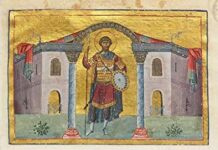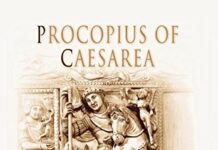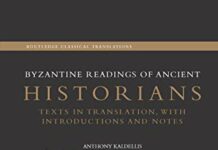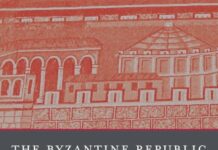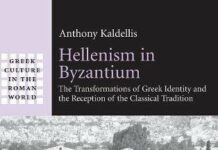
Ebook Info
- Published: 2019
- Number of pages: 392 pages
- Format: PDF
- File Size: 7.69 MB
- Authors: Anthony Kaldellis
Description
A leading historian argues that in the empire we know as Byzantium, the Greek-speaking population was actually Roman, and scholars have deliberately mislabeled their ethnicity for the past two centuries for political reasons.Was there ever such a thing as Byzantium? Certainly no emperor ever called himself “Byzantine.” And while the identities of minorities in the eastern empire are clear―contemporaries speak of Slavs, Bulgarians, Armenians, Jews, and Muslims―that of the ruling majority remains obscured behind a name made up by later generations.Historical evidence tells us unequivocally that Byzantium’s ethnic majority, no less than the ruler of Constantinople, would have identified as Roman. It was an identity so strong in the eastern empire that even the conquering Ottomans would eventually adopt it. But Western scholarship has a long tradition of denying the Romanness of Byzantium. In Romanland, Anthony Kaldellis investigates why and argues that it is time for the Romanness of these so-called Byzantines to be taken seriously.In the Middle Ages, he explains, people of the eastern empire were labeled “Greeks,” and by the nineteenth century they were shorn of their distorted Greekness and became “Byzantine.” Only when we understand that the Greek-speaking population of Byzantium was actually Roman will we fully appreciate the nature of Roman ethnic identity. We will also better understand the processes of assimilation that led to the absorption of foreign and minority groups into the dominant ethnic group, the Romans who presided over the vast multiethnic empire of the east.
User’s Reviews
Editorial Reviews: Review “Romanland is brilliant. With great lucidity, Anthony Kaldellis challenges us to set aside an immense tradition of misdirection. He excavates the conceits by which the West created ‘Byzantium’―and itself―and then demolishes them. Only then do we see what was in fact there all along: a community of Romans, and a polity of remarkable creativity and endurance. This is tremendous scholarship.”―Clifford Ando, author of Roman Social Imaginaries“Ethnicity in the later Roman empire has been highly contested and immensely controversial, from medieval times to the present. Like a Hercules cleaning the Augean stables, Kaldellis is purging the field of the nationalistic contentions and prejudices that have beset scholarship, starting with the artificial name ‘Byzantium.’ This blockbuster of a book performs for ‘Byzantine’ Studies the service that Edward Said’s Orientalism did for Arabic and Islamic Studies. Romanland offers a clean slate for serious and sophisticated study, with love and empathy, of the history of these societies.”―Dimitri Gutas, author of Greek Thought, Arabic Culture“In his most persuasive work to date, Kaldellis calls an astonishing number of medieval witnesses to testify that they were Romans, rather than the ‘Byzantines’ scholars have wanted them to be. This extraordinary book should shift the ground under Byzantine studies.”―Leonora Neville, author of Guide to Byzantine Historical Writing“Fascinating…Kaldellis’s scholarship is always learned, but also fiercely iconoclastic, tearing down orthodoxies that have stood for centuries…[An] innovative and eye-opening book by one of the most important Byzantinists working today.”―Thomas F. Madden, New Criterion About the Author Anthony Kaldellis is Professor and Chair of the Department of Classics at The Ohio State University. He is the author of many books, including The Christian Parthenon, Hellenism in Byzantium, and The Byzantine Republic, which have been translated into French, Greek, and Russian.
Reviews from Amazon users which were colected at the time this book was published on the website:
⭐An incredibly important book that should be the first read by any serious student of Byzantine…err Roman history. Will change the entire framework with which the history of this incredibly important epoch is viewed, and as such must be regarded as indispensable.
⭐The point of this book (in close to 300 pages) is to prove that what is usually called the Byzantine Empire was in fact a nationstate, inhabited by a large and dominant ethnic majority which not only saw itself as Roman and called itself Roman, but actually was Roman. This may sound an exceptional, but as the author points out, it is home from accepted and has in fact for centuries been denied. If this is a topic that interests you, this is a well written book that conclusively proves his point. If this is an issue where you have no opinion and can’t be bothered to form one, don’t bother reading it.
⭐What I liked in the book us that he reasons with convincing evidence about the distortions made by not so recent historiography, I believe for political-geostrategic reasons. The book provides a more balanced view if the Byzantine empire, or more accurately speaking the Eastern Roman empire. More importantly it draws on the latest literature on ethnicity, nation, race etc etc, to explain how people in Ρωμανία viewed themselves, not how we, and modern states in South East Europe, and elsewhere in Europe see things, influenced by midernist approaches, which cease to be convincing. Throws ample light on issues that trouble people on the role of language etc in determing modern concepts if the nation. S.T.
Keywords
Free Download Romanland: Ethnicity and Empire in Byzantium in PDF format
Romanland: Ethnicity and Empire in Byzantium PDF Free Download
Download Romanland: Ethnicity and Empire in Byzantium 2019 PDF Free
Romanland: Ethnicity and Empire in Byzantium 2019 PDF Free Download
Download Romanland: Ethnicity and Empire in Byzantium PDF
Free Download Ebook Romanland: Ethnicity and Empire in Byzantium
